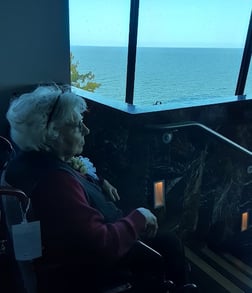When I was a child, my Great Uncle Dayton died suddenly in the barn while walking among his dairy cows. I remember hearing the grown-ups talking quietly at his funeral about his enviable death. “He always said he wanted to die with his boots on.”
Atul Gawande, author of Being Mortal: Medicine and What Matters in the End, says that the two big “unfixables” are aging and dying. These topics claim the front-and-center position in my mind these days as I navigate the end of life with my beloved aunt and uncle. They never had children of their own, but their nieces’ and nephews’ family photos plaster their refrigerator door. All of their siblings are gone now. I am the only niece or nephew living in our state. They have experienced the loss of their siblings, cousins, and friends along with their mobility and memory.

My aunt told me recently, “We used to joke about growing old, but it’s not funny anymore.”
As a Process Consultant, I see the value of planning for the end of life with the same intention that our parents prepared for our births. This kind of planning becomes a gift for our future selves and for those we love. Planning for the end of our lives builds peace proactively. Providing our family members with clarity on our wishes reduced the potential for unhealthy conflict among our family members when we are no longer able to speak for ourselves.
Here are five things I’ve learned:
- Write your will now, no matter what your age. Do not procrastinate. Schedule an appointment with your lawyer or download a free will template to complete. Do it now. Making a will is an act of love for those you leave behind.
- Document your wishes for the end of your life. Create an advance directive. My adult children recommended to me the Five Wishes website to create a legal advance directive. This website helps you to consider in detail what you want. It made me realize that I wanted to give permission and blessing to my adult children to move me out of state, if it became necessary. I also requested end-of-life foot massages!
- Create a medical power of attorney document with your lawyer or online. Name the person(s) who will be entrusted to carry out your advance directive wishes. Consider appointing someone who lives nearby. Talk with those you name about what you want. Include this document with your medical records by faxing it to your doctors. Think about appointing someone nearby.
- Name a legal and financial power of attorney with secondary back-ups. Make sure that the person you name knows of their responsibilities and who to call for information. Make sure that this person connects with your medical power of attorney.
- Wtart talking openly with your family members about how you want to live until the end. What are your hopes and fears? Have the conversation before a crisis happens. Tell your family what you’ve written in your will and the reasoning behind it. Let the person who will be the executor know what their task will entail. Make sure everyone knows who will take care of your finances and medical decisions and what you want. Empower those people with the necessary information while you are still able to do so. Do not make your relatives become detectives to figure out your affairs.
If end of life discussions were an experimental drug, the FDA would approve it. (Atul Gawande, Being Mortal: Medicine and What Matters in the End.)
“Are you interested in exploring this conversation more as an individual or with a group? Email JeanneZimmerlyJantzi@DesignGroupIntl.com and sign up for my blog.
Tags:
process consulting, listening, Jeanne Zimmerly Jantzi, Clarity and Curiosity Blog, dying, death and dying/Jeanne%20Zimmerly-Jantzi%20Headshot%20(300x300).png)
December 7, 2022
Comments